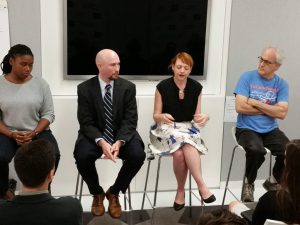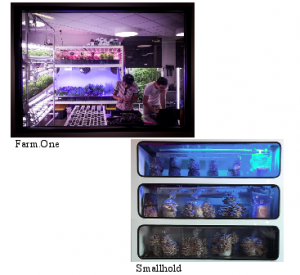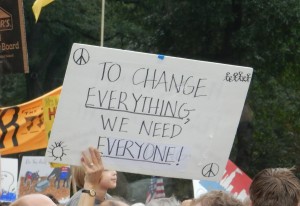Tag: educational-resources
November 26, 2020
GreenHomeNYC’s Pandemic Pivot Proves the Power of Commitment and Community
By Melanie Mason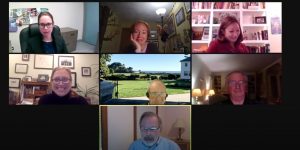 We have spent the better part of our year in throes of the COVID-19 pandemic—social distancing, Zooming, washing our hands like crazy, and carrying out GreenHomeNYC’s mission from the kitchen table. This has almost begun to feel like a normal part of our routines. But at the beginning of the lockdowns back in March, the challenges to life as usual suddenly felt very far from “normal.” Just like everyone else, GreenHomeNYC had to quickly adapt to this new way of being. A testimony to our incredibly driven volunteers, together we dove headfirst into tackling how GreenHomeNYC would go from a live and lively in-person community to operating fully remotely.
Said GreenHomeNYC’s board president Lucie Dupas, “The board is so thankful for all the amazing work that our volunteers are able to get done safely from their homes—this year has been incredibly challenging in all aspects of life, and we are amazed on a daily basis by how passionate and resilient our whole community is!”
(more…)
We have spent the better part of our year in throes of the COVID-19 pandemic—social distancing, Zooming, washing our hands like crazy, and carrying out GreenHomeNYC’s mission from the kitchen table. This has almost begun to feel like a normal part of our routines. But at the beginning of the lockdowns back in March, the challenges to life as usual suddenly felt very far from “normal.” Just like everyone else, GreenHomeNYC had to quickly adapt to this new way of being. A testimony to our incredibly driven volunteers, together we dove headfirst into tackling how GreenHomeNYC would go from a live and lively in-person community to operating fully remotely.
Said GreenHomeNYC’s board president Lucie Dupas, “The board is so thankful for all the amazing work that our volunteers are able to get done safely from their homes—this year has been incredibly challenging in all aspects of life, and we are amazed on a daily basis by how passionate and resilient our whole community is!”
(more…)
January 27, 2020
GreenHomeNYC Careers Recap: Careers in the New Green Economy — Government Edition
By Jonathan Oriondo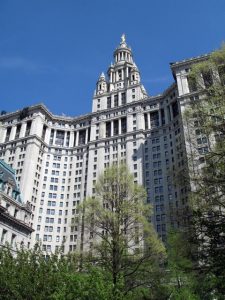 On October 29th, GreenHomeNYC convened a panel discussion on sustainability careers in government, a field that promises change and growth in the new green economy. In New York in particular, breakthrough climate legislation is not just leading the way to a carbon neutral city; as our speakers demonstrated, it is also leading to innovative and meaningful careers.
(more…)
On October 29th, GreenHomeNYC convened a panel discussion on sustainability careers in government, a field that promises change and growth in the new green economy. In New York in particular, breakthrough climate legislation is not just leading the way to a carbon neutral city; as our speakers demonstrated, it is also leading to innovative and meaningful careers.
(more…)
September 4, 2019
Recap: Tour of the East River Compost Yard
By Jonathan Oriondo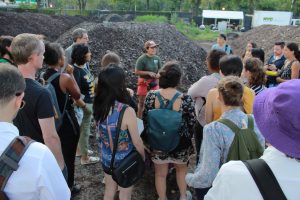 On August 15th, GreenHomeNYC hosted a tour of the East River Compost Yard in Manhattan, where participants learned what it takes to compost on a community-wide scale. Lia Lucero, the outreach coordinator for NYC Compost Project, personally guided us throughout the site.
At first glance it was not obvious that this facility’s main goal was community education. Right on the river, in the middle of a park, this place was huge! There were piles of compost at various stages of the digestion process. Most of the facility was outdoors with a small administrative building towards the road, and it was all surrounded by a formidable fence. It was very impressive—even the smell. (more…)
On August 15th, GreenHomeNYC hosted a tour of the East River Compost Yard in Manhattan, where participants learned what it takes to compost on a community-wide scale. Lia Lucero, the outreach coordinator for NYC Compost Project, personally guided us throughout the site.
At first glance it was not obvious that this facility’s main goal was community education. Right on the river, in the middle of a park, this place was huge! There were piles of compost at various stages of the digestion process. Most of the facility was outdoors with a small administrative building towards the road, and it was all surrounded by a formidable fence. It was very impressive—even the smell. (more…)
May 9, 2019
Green Careers: Sustainable Career Tracks: Non-Profit Edition
Interested in the Sustainability Non-Profit Sector? Join us for a panel on Non-Profits!
 When sustainability challenges fall outside the domain of market solutions, who is there to provide redress? Non-profits can satisfy energy and environmental problems of great import that financial interest may ignore. Come learn lessons from professionals experienced in navigating careers in the sustainability non-profit sector.
Date: May 14th, 2019
Time: 6:30pm – 8:00pm with networking afterwards
Location: BrightPower, Flr 21, 11 Hanover Square, New York NY 10005
Speakers:
Danielle Bissett – Billion Oyster Project
Adam Romano – AEE
Irene Nielson – NRDC
Note: To respect the time of our speakers and guests, the event will start promptly at 6:30.
Register Here!
When sustainability challenges fall outside the domain of market solutions, who is there to provide redress? Non-profits can satisfy energy and environmental problems of great import that financial interest may ignore. Come learn lessons from professionals experienced in navigating careers in the sustainability non-profit sector.
Date: May 14th, 2019
Time: 6:30pm – 8:00pm with networking afterwards
Location: BrightPower, Flr 21, 11 Hanover Square, New York NY 10005
Speakers:
Danielle Bissett – Billion Oyster Project
Adam Romano – AEE
Irene Nielson – NRDC
Note: To respect the time of our speakers and guests, the event will start promptly at 6:30.
Register Here!
October 31, 2018
October Green Careers Recap: Sustainable Career Tracks: NYC Government
By Radhna Saxena Photos By Jessica Bartolini On October 9, Green Careers hosted a Career Tracks panel on NYC government jobs. Professionals working to advance sustainability causes in various government sectors discussed their educational background, first steps in the sustainability industry, and job roles and responsibilities, while offering advice to those seeking a career in governmental sustainability. Environmental Remediation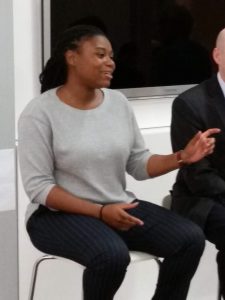 Kestana Anokye is a Project Manager in the NYC Office of Environmental Remediation, the agency that designs and operates municipal programs for cleanup and redevelopment of vacant contaminated lands. Anokye has a background in Geological Sciences and worked with two environmental consulting companies after college. Two years into her second job, she realized her growing passion for sustainability. When a colleague suggested that she attend forums, like those hosted by GreenHomeNYC, to learn about opportunities in the field, it seemed a bit intimidating that almost every speaker had a degree in engineering. But she was determined to find a way to combine her skills and training with her interests to find the right job.
While networking is invaluable, Anokye advised that persistence in your job search is most important, even when things don’t work out immediately. That tenacity and patience led to her current position at the NYC Office of Environmental Remediation.
Energy Management
Kestana Anokye is a Project Manager in the NYC Office of Environmental Remediation, the agency that designs and operates municipal programs for cleanup and redevelopment of vacant contaminated lands. Anokye has a background in Geological Sciences and worked with two environmental consulting companies after college. Two years into her second job, she realized her growing passion for sustainability. When a colleague suggested that she attend forums, like those hosted by GreenHomeNYC, to learn about opportunities in the field, it seemed a bit intimidating that almost every speaker had a degree in engineering. But she was determined to find a way to combine her skills and training with her interests to find the right job.
While networking is invaluable, Anokye advised that persistence in your job search is most important, even when things don’t work out immediately. That tenacity and patience led to her current position at the NYC Office of Environmental Remediation.
Energy Management
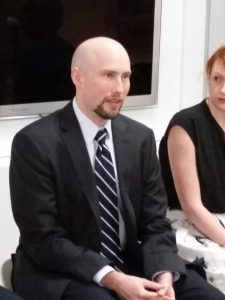 Michael Roos graduated with a liberal arts degree in economics and geography, and didn’t foresee his current role as a Building Performance Analyst for the NYC Department of Citywide Administrative Services Division of Energy Management. While pursuing his master’s degree at Columbia University, Roos learned about the role that local governments play in advancing urban sustainability, with Mayor Michael Bloomberg’s PlaNYC serving as a case study. One of his professors encouraged him to apply for an internship in the Energy Department of the New York City Housing Authority (NYCHA). Interning with the largest public housing authority in North America was a valuable introduction to the field of energy management in city government.
Roos returned to the Energy Department in a permanent capacity as an Energy Analyst, deploying his data analysis skills to work extensively with the Utility Management Information System (UMIS), NYCHA’s utility bill database. He working with technical consultants to conduct energy analyses of NYCHA’s 2,500 residential buildings and facilitate energy benchmarking in compliance with New York City’s local laws. After a few years, he transitioned to his current role at the Department of Citywide Administrative Services, which serves as the hub of energy management activities for over 4,000 municipal buildings across the five boroughs. His role involves managing energy and performance in alignment with Mayor DeBlasio’s goal of a 35% reduction in greenhouse gas emissions from municipal buildings by 2025.
Roos advised job seekers to set up a keyword search on the city’s job website and DCAS Energy Management to stay abreast of new opportunities in city government. He noted that networking is an effective way to connect with the tightly-knit community of energy and sustainability professionals in New York. He added that the DCAS-administered Energy Management Institute offers continuing education classes for city workers to enhance their technical knowledge.
Sustainable Communities
Michael Roos graduated with a liberal arts degree in economics and geography, and didn’t foresee his current role as a Building Performance Analyst for the NYC Department of Citywide Administrative Services Division of Energy Management. While pursuing his master’s degree at Columbia University, Roos learned about the role that local governments play in advancing urban sustainability, with Mayor Michael Bloomberg’s PlaNYC serving as a case study. One of his professors encouraged him to apply for an internship in the Energy Department of the New York City Housing Authority (NYCHA). Interning with the largest public housing authority in North America was a valuable introduction to the field of energy management in city government.
Roos returned to the Energy Department in a permanent capacity as an Energy Analyst, deploying his data analysis skills to work extensively with the Utility Management Information System (UMIS), NYCHA’s utility bill database. He working with technical consultants to conduct energy analyses of NYCHA’s 2,500 residential buildings and facilitate energy benchmarking in compliance with New York City’s local laws. After a few years, he transitioned to his current role at the Department of Citywide Administrative Services, which serves as the hub of energy management activities for over 4,000 municipal buildings across the five boroughs. His role involves managing energy and performance in alignment with Mayor DeBlasio’s goal of a 35% reduction in greenhouse gas emissions from municipal buildings by 2025.
Roos advised job seekers to set up a keyword search on the city’s job website and DCAS Energy Management to stay abreast of new opportunities in city government. He noted that networking is an effective way to connect with the tightly-knit community of energy and sustainability professionals in New York. He added that the DCAS-administered Energy Management Institute offers continuing education classes for city workers to enhance their technical knowledge.
Sustainable Communities
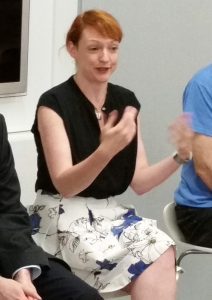 As Director of Strategic Alignment & Implementation for NRDC’s Healthy People & Thriving Communities (HP&TC) Program, Lindsay Robbins works to foster the development of healthy, sustainable communities for all. While studying film and TV production at NYU, she discovered a love for urban studies and decided to pursue a master’s degree in urban planning. During this period, she became involved with several environmental groups at NYU that banded together to advocate for an environmental program at the university and the adoption of sustainable practices. Leading the effort with a few fellow students, Robbins successfully advocated to set up the program and bring other sustainability initiatives to the campus. After graduation, she was hired by NYU to assist in the planning, design, and renovation of university buildings.
Robbins moved into government work when she was hired to work on multifamily efficiency programs at NYSERDA. Working in NYSERDA’s then-small NYC office was a great advantage, as it helped her take on a lot of responsibility quickly. Subsequently she worked for the state of Maryland, managing an energy assistance program for low income households, where she worked to weave energy efficiency into the mix. Now at NRDC, Robbins works on energy efficiency for the affordable housing sector, helping the HP&TC program achieve its broader goals.
She advised job seekers not to be discouraged by the lack of a technical degree; this is a field that requires a variety of skill sets and there are ample opportunities to learn, if you remain curious and keep asking questions.
Housing Development
As Director of Strategic Alignment & Implementation for NRDC’s Healthy People & Thriving Communities (HP&TC) Program, Lindsay Robbins works to foster the development of healthy, sustainable communities for all. While studying film and TV production at NYU, she discovered a love for urban studies and decided to pursue a master’s degree in urban planning. During this period, she became involved with several environmental groups at NYU that banded together to advocate for an environmental program at the university and the adoption of sustainable practices. Leading the effort with a few fellow students, Robbins successfully advocated to set up the program and bring other sustainability initiatives to the campus. After graduation, she was hired by NYU to assist in the planning, design, and renovation of university buildings.
Robbins moved into government work when she was hired to work on multifamily efficiency programs at NYSERDA. Working in NYSERDA’s then-small NYC office was a great advantage, as it helped her take on a lot of responsibility quickly. Subsequently she worked for the state of Maryland, managing an energy assistance program for low income households, where she worked to weave energy efficiency into the mix. Now at NRDC, Robbins works on energy efficiency for the affordable housing sector, helping the HP&TC program achieve its broader goals.
She advised job seekers not to be discouraged by the lack of a technical degree; this is a field that requires a variety of skill sets and there are ample opportunities to learn, if you remain curious and keep asking questions.
Housing Development
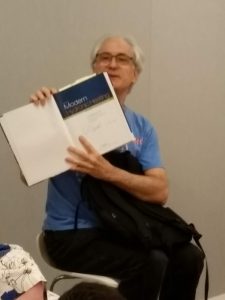 Tom Sahagian has had extensive experience working in private, non-profit, and governmental jobs, including the NYC Department of Housing Preservation & Development. He obtained a degree in journalism, later deciding to make the move into energy efficiency. But he noted that his ability to write well has been a huge advantage over his entire career.
Although there are pros and cons to working in government, he felt one compelling advantage is that government organizations are not driven by profit. The tendency to care more about the work, rather than gains or paybacks, can be a rewarding experience.
Sahagian’s advice is to be willing to start at the bottom, work hard, and learn new things every day to steadily climb up the ladder. He recommended pursuing continuing education for technical topics, and reading magazines on energy efficiency to stay abreast of the latest tools, technologies, and concepts. A few other important qualities for success: Be smart and committed. Be ready to do a lot of reading, and don’t be afraid to ask questions.
The panelists noted there’s often a long period between applying for a government job and getting an interview, so it’s important to be patient and persistent. And they agreed that regardless of your educational background, keep learning, keep reading, and keep applying until you find your dream job in sustainability.
Tom Sahagian has had extensive experience working in private, non-profit, and governmental jobs, including the NYC Department of Housing Preservation & Development. He obtained a degree in journalism, later deciding to make the move into energy efficiency. But he noted that his ability to write well has been a huge advantage over his entire career.
Although there are pros and cons to working in government, he felt one compelling advantage is that government organizations are not driven by profit. The tendency to care more about the work, rather than gains or paybacks, can be a rewarding experience.
Sahagian’s advice is to be willing to start at the bottom, work hard, and learn new things every day to steadily climb up the ladder. He recommended pursuing continuing education for technical topics, and reading magazines on energy efficiency to stay abreast of the latest tools, technologies, and concepts. A few other important qualities for success: Be smart and committed. Be ready to do a lot of reading, and don’t be afraid to ask questions.
The panelists noted there’s often a long period between applying for a government job and getting an interview, so it’s important to be patient and persistent. And they agreed that regardless of your educational background, keep learning, keep reading, and keep applying until you find your dream job in sustainability.
August 31, 2018
Handling Tough Talk: Communication strategies for critical times
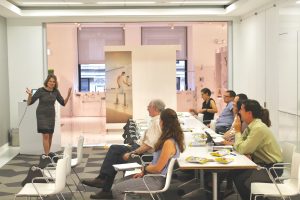 By Elise Baker
Whether you are an activist making an argument for climate policy or a prospective employee taking interviews in the green sector, persuading an audience requires nuance and skill. But how do you develop a powerful voice that will bridge the divide or get your foot in the door?
On August 14, Pamela Berns, leadership coach and global communications consultant, offered expert advice at the GreenHomeNYC Green Careers meetup, which was hosted at the GROHELIVE! Center and catered by Vegan Outreach.
Berns opened with a slide showing pictures of confident speakers. “Communication looks fun,” she said. “Everybody does it, no matter how old or young you are. Looks easy. But is it?”
Berns suggested that persuading listeners to change their point of view is actually a complex task. Three elements can make it difficult to accomplish: internal noise, frame of reference, and nonverbal codes.
Berns began with internal noise, which is similar to static on a telephone line. Rarely do people engage in pure listening, she said, and internal noise causes distractions. One audience member might remember that he forgot to add milk to the grocery list. Another might be so entrenched in her point of view that she can’t hear what the speaker is actually saying.
(more…)
By Elise Baker
Whether you are an activist making an argument for climate policy or a prospective employee taking interviews in the green sector, persuading an audience requires nuance and skill. But how do you develop a powerful voice that will bridge the divide or get your foot in the door?
On August 14, Pamela Berns, leadership coach and global communications consultant, offered expert advice at the GreenHomeNYC Green Careers meetup, which was hosted at the GROHELIVE! Center and catered by Vegan Outreach.
Berns opened with a slide showing pictures of confident speakers. “Communication looks fun,” she said. “Everybody does it, no matter how old or young you are. Looks easy. But is it?”
Berns suggested that persuading listeners to change their point of view is actually a complex task. Three elements can make it difficult to accomplish: internal noise, frame of reference, and nonverbal codes.
Berns began with internal noise, which is similar to static on a telephone line. Rarely do people engage in pure listening, she said, and internal noise causes distractions. One audience member might remember that he forgot to add milk to the grocery list. Another might be so entrenched in her point of view that she can’t hear what the speaker is actually saying.
(more…)
August 8, 2018
August Forum: The Community-Driven Sustainable Economy with Hunter Lovins
 How can an individual drive sustainable economic development in a city of 10 MILLION?
On August 23rd, join Hunter Lovins, global sustainability pioneer and Founder of Natural Capital Solutions, to explore the power and potential of local action on sustainable business growth and community development.
In our busy 21st century, technology-bound lives, the idea of community is in some ways diminishing. Why do there seem to be modern dimensions of life that actually reduce the importance of local communities? Are we distorting the very meaning of life when local communities are set up to feed larger societal systems?
As part of this forum, Hunter will introduce us to LASER – Local Action for Sustainable Economic Renewal. The LASER platform’s purpose is to create wealth that provides people with long term economic security and the ability of future generations to live healthy and fulfilled lives. Real wealth is inextricably linked to the satisfaction of our human needs and overall well-being. The LASER approach provides a structure for how individuals and organizations can impact economic advancement within their communities and sustainably improve the lives of others.
It may be easy to get lost in the speed and vastness of New York City, but there are powerful tools and techniques for individuals to discover what community really means and first-handedly drive economic and social impact in this concrete jungle.
We look forward to seeing you at the August forum with Hunter!
The forum is presented by GreenHomeNYC in collaboration with Bard College’s MBA in Sustainability program. We thank Bard in advance for kindly hosting this event at their NYC satellite campus within the LMHQ collaborative workspace.
Date: Thursday, August 23rd, 2018
Time: 6:30 PM – 8:00 PM
Location: LMHQ, 150 Broadway, 20th Floor, New York, NY 10038
Register here!
Our featured speaker will be:
How can an individual drive sustainable economic development in a city of 10 MILLION?
On August 23rd, join Hunter Lovins, global sustainability pioneer and Founder of Natural Capital Solutions, to explore the power and potential of local action on sustainable business growth and community development.
In our busy 21st century, technology-bound lives, the idea of community is in some ways diminishing. Why do there seem to be modern dimensions of life that actually reduce the importance of local communities? Are we distorting the very meaning of life when local communities are set up to feed larger societal systems?
As part of this forum, Hunter will introduce us to LASER – Local Action for Sustainable Economic Renewal. The LASER platform’s purpose is to create wealth that provides people with long term economic security and the ability of future generations to live healthy and fulfilled lives. Real wealth is inextricably linked to the satisfaction of our human needs and overall well-being. The LASER approach provides a structure for how individuals and organizations can impact economic advancement within their communities and sustainably improve the lives of others.
It may be easy to get lost in the speed and vastness of New York City, but there are powerful tools and techniques for individuals to discover what community really means and first-handedly drive economic and social impact in this concrete jungle.
We look forward to seeing you at the August forum with Hunter!
The forum is presented by GreenHomeNYC in collaboration with Bard College’s MBA in Sustainability program. We thank Bard in advance for kindly hosting this event at their NYC satellite campus within the LMHQ collaborative workspace.
Date: Thursday, August 23rd, 2018
Time: 6:30 PM – 8:00 PM
Location: LMHQ, 150 Broadway, 20th Floor, New York, NY 10038
Register here!
Our featured speaker will be:
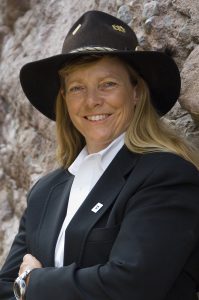 L. Hunter Lovins is the President and Founder of Natural Capitalism Solutions (NCS), a non-profit formed in 2002 in Longmont, CO. A renowned author and champion of sustainable development for over 35 years, Hunter has consulted on business, economic development, sustainable agriculture, energy, water, security, and climate policies for scores of governments, communities, and companies worldwide. Within the United States, she has consulted for heads of state, departments of defense, energy agencies and hundreds of state and local agencies.
Hunter believes that citizens, communities and companies, working together within the market context, are the most dynamic problem-solving force on the planet. She has devoted herself to building teams that can create and implement practical and affordable solutions to the problems facing us in creating a sustainable future.
Hunter has co‐authored fifteen books and hundreds of articles, and was featured in the award‐winning film, Lovins On the Soft Path. Time Magazine recognized her as a Millennium Hero for the Planet, and Newsweek called her the Green Business Icon. She has taught at numerous universities around the world and is currently a founding professor of Sustainable Management at Bard MBA.
L. Hunter Lovins is the President and Founder of Natural Capitalism Solutions (NCS), a non-profit formed in 2002 in Longmont, CO. A renowned author and champion of sustainable development for over 35 years, Hunter has consulted on business, economic development, sustainable agriculture, energy, water, security, and climate policies for scores of governments, communities, and companies worldwide. Within the United States, she has consulted for heads of state, departments of defense, energy agencies and hundreds of state and local agencies.
Hunter believes that citizens, communities and companies, working together within the market context, are the most dynamic problem-solving force on the planet. She has devoted herself to building teams that can create and implement practical and affordable solutions to the problems facing us in creating a sustainable future.
Hunter has co‐authored fifteen books and hundreds of articles, and was featured in the award‐winning film, Lovins On the Soft Path. Time Magazine recognized her as a Millennium Hero for the Planet, and Newsweek called her the Green Business Icon. She has taught at numerous universities around the world and is currently a founding professor of Sustainable Management at Bard MBA.
March 1, 2018
January Forum Recap: The Green Catwalk
by Jenny Nicolas At the annual GreenHomeNYC Green Catwalk, seven speakers presented the latest information on everything from ventilation to greening the moving industry to O&M to-do lists within the sustainability space. Part 1: Eat, Breathe, Move, & Check Sustainably Changing Our Relationship with Food Ricky Stephens, co-founder of AgTech X, set the stage by presenting some of the biggest flaws within our country’s current food system. He indicated that 80% of the food grown today is not meant for human consumption, with 40% grown to support animals and 40% to be processed into biofuels. Additionally, though the plant kingdom is diverse, 84% of total US cropland is dedicated to just three crops: corn, soybean, and wheat. The long term prospects for the system are also in jeopardy as farming is not attracting new folks to the industry – the average age of a U.S. farmer is 58. What can be done to fix our current system? The goal of AgTech X is to create a new food economy, using urban farming as a vehicle to educate, decentralize, and make farming exciting again. AgTech X fosters a collective community by hosting classes, workshops and tours. Its co-lab workspace supports decentralized urban farming methods like Farm One and Smallhold, indoor farms housed in restaurants that produce farm-to-table microgreens. And a recent “Intro to Aquaponics” class by Oko Farms explained the closed-loop system of raising fish, creating fertilizer for plant growth and filtering the water. While urban farming is not a new concept, innovations in the past five years are making it a more intriguing career option for young professionals! (more…)February 27, 2018
Sustainable Farm Life at Queens County Farm Museum
by Kimberly Stempien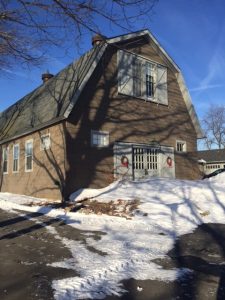 Where can you visit a farm within the five boroughs of New York City? Queens County Farm Museum, in Floral Park, Queens, a 47-acre working farm with a focus on sustainable agriculture. Purchased in 1975 by the NYC Department of Parks, the farm dates back to 1697. In the 1800’s, it was a very productive truck farm, which used wagons to deliver produce into the NYC markets. Today, the farm focuses on sustainable agriculture and educational programs for children and adults.
Ali Abate, Director of Education, began working at the farm in the summer of 2013, bringing a background in youth development, program planning, staff management and a passion for sustainability and agriculture. She emphasized that the farm provides a vital service to the community by providing a peaceful solace from the hustle and bustle of New York City, while offering a number of excellent programs related to sustainability education.
(more…)
Where can you visit a farm within the five boroughs of New York City? Queens County Farm Museum, in Floral Park, Queens, a 47-acre working farm with a focus on sustainable agriculture. Purchased in 1975 by the NYC Department of Parks, the farm dates back to 1697. In the 1800’s, it was a very productive truck farm, which used wagons to deliver produce into the NYC markets. Today, the farm focuses on sustainable agriculture and educational programs for children and adults.
Ali Abate, Director of Education, began working at the farm in the summer of 2013, bringing a background in youth development, program planning, staff management and a passion for sustainability and agriculture. She emphasized that the farm provides a vital service to the community by providing a peaceful solace from the hustle and bustle of New York City, while offering a number of excellent programs related to sustainability education.
(more…)

